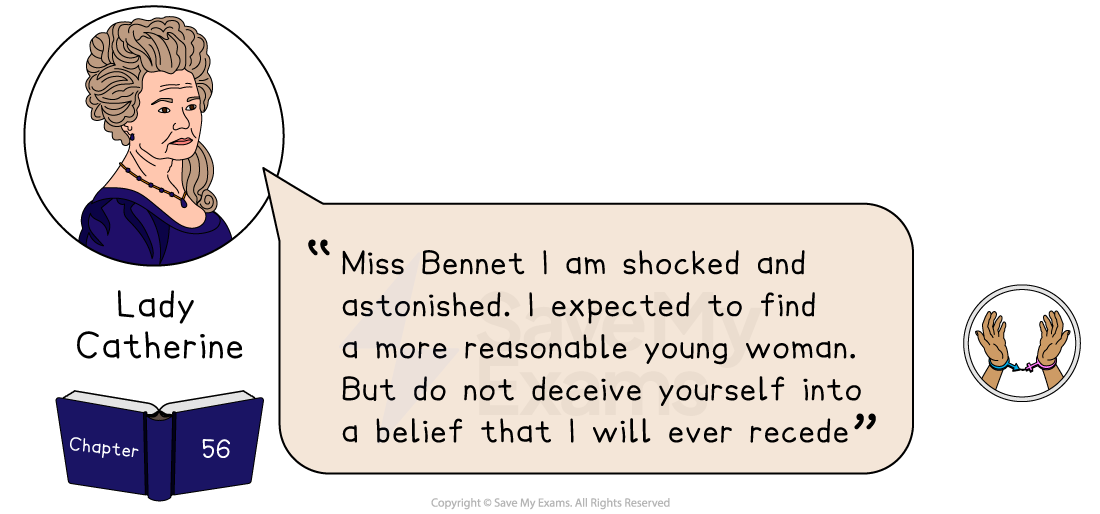Love is an important theme in the novel and influences many of the decisions the characters make in the story.

“It is a truth universally acknowledged, that a single man in possession of a good fortune, must be in want of a wife” – Narrator, Chapter 1
Meaning and context
- This is the celebrated first line of the novel
- It introduces the central theme of the novel, which is marriage
Analysis
- The writer uses satire and irony to highlight how the universal “truth” might more accurately represent the inherent materialism and underlying social pressures of her society than an absolute truth
- The phrase underlines the importance of socially advantageous marriages for both men and women:
- The emphasis on “good fortune” as a motivation for marriage highlights the financial nature of marriages during that time
- The quote also introduces the key themes of the novel – marriage and wealth – which are central to the plot

“Jane should therefore make the most of every half hour in which she can command his attention. When she is secure of him, there will be leisure for falling in love as much as she chuses.” – Charlotte Lucas, Chapter 6
Meaning and context
- Charlotte and Elizabeth are discussing Jane and Mr Bingley’s relationship
- Charlotte believes that Jane must secure Mr Bingley’s attention and subsequently his affection, rather than being concerned with her own feelings of love
Analysis
- The quote suggests a strategic and calculated approach to marriage, emphasising the importance of making the most of every opportunity to capture a man’s attention
- The use of the phrase “every half hour” suggests that women – in this case, Jane – have limited time to capture a man’s attention:
- This adds a sense of urgency and turns a courtship into a tactical opportunity
- Charlotte sees Mr Bingley’s time and attention as valuable resources that Jane should use to her advantage
- The phrase “secure of him” serves to underline the importance of marriage to women’s future security:
- It reflects the pressure that women were under at that time and how a woman’s success and prosperity were intrinsically connected to her marital choices
- Charlotte’s advice highlights the tension between realism and idealism in the novel:
- Charlotte reflects a pragmatic and practical view of marriage whereas Elizabeth represents a more idealistic and romantic perspective on marriage

“My situation in life, my connections with the family of De Bourgh, and my relationship to your own, are circumstances highly in my favour; and you should take it into farther consideration that in spite of your manifold attractions, it is by no means certain that another offer of marriage may ever be made you” – Mr Collins, Chapter 19
Meaning and context
- Mr Collins has decided to propose to Elizabeth Bennet:
- He feels that it is a suitable match as he is set to inherit Mr Bennet’s estate when he dies
- He also feels that he is a suitable match because Elizabeth’s prospects are narrow due to her lack of fortune and social connections
Analysis
- Mr Collins begins by emphasising his own excellent situation and good connections:
- The tone suggests his profound sense of self-importance and entitlement
- He believes that his association with Lady Catherine de Bourgh makes him a desirable partner
- The quotation highlights how Mr Collins views the marriage as both advantageous and and desirable to both:
- The emphasis on “manifold attractions” is framed more as a matter of practicality than genuine romantic interest
- Mr Collins highlights how Elizabeth should be flattered by his proposal given that his situation in life is superior to hers
- His proposal carries an undertone of manipulation and an attempt to pressure Elizabeth into accepting the proposal:
- Mr Collins uses the uncertainty of future marriage offers as a means of creating a sense of urgency
- This quote emphasises the expectations society had of women and how they should consider marriages based on practicality and future comfort rather than love:
- It is a stark contrast with Elizabeth’s values as she values genuine affection and connection in a marriage
- It could be argued that Austen uses Mr Collins’s proposal to mock 19th-century ideas of marriage based on social and monetary advantage rather than emotional connection








